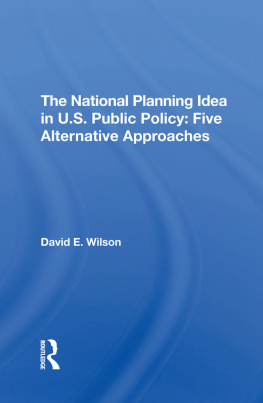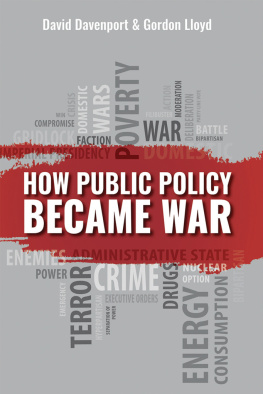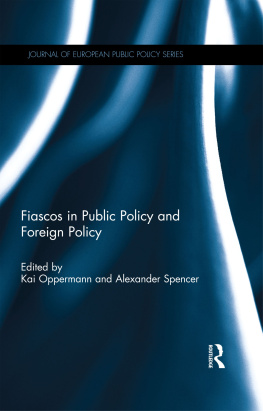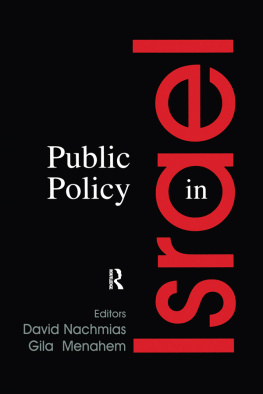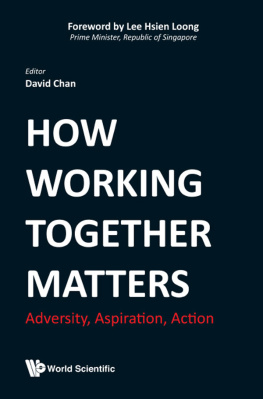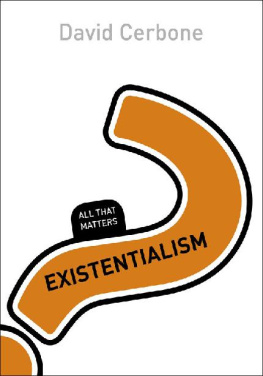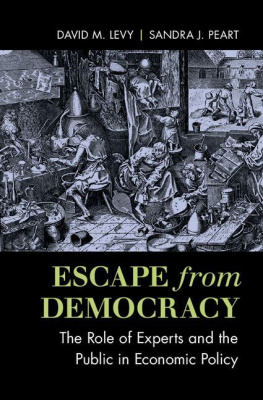David Chrisinger - Public Policy Writing That Matters
Here you can read online David Chrisinger - Public Policy Writing That Matters full text of the book (entire story) in english for free. Download pdf and epub, get meaning, cover and reviews about this ebook. year: 2017, genre: Politics. Description of the work, (preface) as well as reviews are available. Best literature library LitArk.com created for fans of good reading and offers a wide selection of genres:
Romance novel
Science fiction
Adventure
Detective
Science
History
Home and family
Prose
Art
Politics
Computer
Non-fiction
Religion
Business
Children
Humor
Choose a favorite category and find really read worthwhile books. Enjoy immersion in the world of imagination, feel the emotions of the characters or learn something new for yourself, make an fascinating discovery.

- Book:Public Policy Writing That Matters
- Author:
- Genre:
- Year:2017
- Rating:3 / 5
- Favourites:Add to favourites
- Your mark:
- 60
- 1
- 2
- 3
- 4
- 5
Public Policy Writing That Matters: summary, description and annotation
We offer to read an annotation, description, summary or preface (depends on what the author of the book "Public Policy Writing That Matters" wrote himself). If you haven't found the necessary information about the book — write in the comments, we will try to find it.
Public Policy Writing That Matters — read online for free the complete book (whole text) full work
Below is the text of the book, divided by pages. System saving the place of the last page read, allows you to conveniently read the book "Public Policy Writing That Matters" online for free, without having to search again every time where you left off. Put a bookmark, and you can go to the page where you finished reading at any time.
Font size:
Interval:
Bookmark:
PUBLIC POLICY WRITING
THAT MATTERS
DAVID CHRISINGER

2017 Johns Hopkins University Press
All rights reserved. Published 2017
Printed in the United States of America on acid-free paper
9 8 7 6 5 4 3 2 1
Johns Hopkins University Press
2715 North Charles Street
Baltimore, Maryland 21218-4363
www.press.jhu.edu
Library of Congress Cataloging-in-Publication Data
Names: Chrisinger, David, 1986 author.
Title: Public policy writing that matters / David Chrisinger.
Description: Baltimore : Johns Hopkins University Press, 2017. | Includes
bibliographical references and index.
Identifiers: LCCN 2016033367| ISBN 9781421422268 (paperback) |
ISBN 9781421422275 (electronic) | ISBN 1421422263 (paperback)
Subjects: LCSH: Communication in public administration. | Communication in politics. | Written communication. | Persuasion (Rhetoric)
Political aspects. | BISAC: TECHNOLOGY & ENGINEERING /
Technical Writing. | BUSINESS & ECONOMICS / Business Writing. | POLITICAL SCIENCE / Public Policy / General. | POLITICAL SCIENCE / Government / National. | REFERENCE / Writing Skills.
Classification: LCC JF1525.C59 C35 2017 | DDC 808.06/632dc23
LC record available at https://lccn.loc.gov/2016033367
A catalog record for this book is available from the British Library.
Special discounts are available for bulk purchases of this book. For more information, please contact Special Sales at 410-516-6936 or .
Johns Hopkins University Press uses environmentally friendly book materials, including recycled text paper that is composed of at least 30 percent post-consumer waste, whenever possible.
The scariest moment is always
just before you start. After that,
things can only get better.
Stephen King
When I started working at the Government Accountability Office (GAO) in 2010, I never thought I would someday sit down to compose a thank-you to all those who have helped me write this book. I was an academic-in-training who was planning on waiting out the recession by working for the federal government. Two years. Thats how long they said I had to commit, and thats how long I thought I would stay. After two years, I would return to graduate school, finish my PhD in German history, and land some amazing tenure-track jobor so I had planned. But then I fell in love with public policy, and I have Patrick DiBattista, my first boss and one of my most cherished mentors, to thank for that. From day one, Patrick gave me the confidence to advocate for better writing and storytelling. He believed in me and my abilities and was always there when I needed him. I probably wouldnt have made public policy writing my profession were it not for him.
Id also like to thank Amy Buck, an analyst at GAO who has become a good friend and who helped me land the job that led to this book. After working with me on a report, Amy introduced me to Carey Borkoski, who was directing the Master of Public Policy Program at Johns Hopkins University, Amys alma mater. Based on Amys recommendation, Carey hired me to teach an intensive public policy writing course to the new graduate students. This book comes from the class I developed there. Thank you, Carey, for all the years of support.
There are others at GAO I cannot forget to mention. Barbara Bovbjerg, our fearless leader, has always been supportive and has pushed our team to be better storytellers. Shes given me free rein to teach writing in a variety of nonconventional ways, including a series of Schoolhouse Rockstyle training courses for government auditors. Thank you to Sue Bernstein and James Bennett and a whole host of others for helping make those courses a reality. Id also like to thank Andy Sherrill and Kate van Gelder for trusting me and affording me this opportunity to do what I love. My fellow communications analystsHolly Dye, Susan Aschoff, and Charlie Wilsonhave also been encouraging and have taught me plenty about what it takes to write effective public policy. My sincerest thanks also go out to Dorothy Goldsmith, who runs the writing training at GAO, for believing in me and sending me all over the country to teach. Perhaps most importantly, though, Id like to thank Dorothy for continually helping me work through different writing challenges and for helping me find new ways to improve the writing at GAO. Collin Fallon and Allison ONeill have been great as co-instructors. They never mind when I pick their brains, and I appreciate their collaboration.
Almost three years ago, I had a kernel of an idea that eventually became this book. Before my plan was fully developed, I reached out to Johns Hopkins University Press. Fifteen minutes after I sent that fateful email, Kelley Squazzo answered my query and helped me put together a proposal. Before she left the Press, she championed my work, and I cannot thank her enough for all she did to make this book a reality. Id also like to thank her successor, Robin Coleman, for his tireless support of this project. Ive learned a great deal from him. In addition, this book has been greatly improved by the keen insights provided by my copyeditor, Julia Ridley Smith.
Lastly, Id like to thank my beautiful and loving wife, Ashley, for so selflessly putting up with my absences and for always believing in me. I could not do this without her.
PUBLIC POLICY WRITING
THAT MATTERS
If youre reading this book, Im willing to bet youre passionate about public policy and its power to make real, principled, and lasting change in the world. You also probably suspect that the way in which public policy is written matters as muchif not morethan the substance of the policy itself. As public policy professionals, we can have amazing ideas on how to improve the world, but if we arent able to communicate these ideas well, they wont become reality. If youre new to this world of analysis, decision making, and communication for the public good, you might assume that policies gain support and are eventually implemented because of their methodological soundness or logic. While these things matter, the most effective professionals in this field are the ones who have mastered the power of persuasion. They are able to capture their readers attention, and they are able to move their readers, to make them care enough to do something about the problems theyve found. It is important to realize that the most difficult work public policy professionals do is not developing a point of view but rather getting someone in power to agree with that point of view. This book is intended to help you with both.
Even if youve been around the world of public policy for some time, youll benefit from reading this book. If theres one thing Ive learned about public policy, its that writing almost always takes a back seat to sound analysis. We spend a huge amount of time trying to figure out what we want to say, which sometimes results in not having enough time to figure out how we want to say it. Its my hope that youll read this book, dog-ear the pages that are most helpful to you, and pull it off the shelf each time you sit down to write a report or memo.
The central argument of this book is relatively simple: Writers of public policy are most effective and persuasive when they tell clear and concise stories. Short, smart, and simple are our goals. Clear and concise stories help make complex information and analyses accessible; they make them more interesting and persuasive, as well. Unfortunately, most public policy writing consists not of clear and concise stories but of muddled arguments and overly detailed explanations, which are far less persuasive. And even when there is a story to be told, many writers bury that story under jargon, complex sentence constructions, and incoherent paragraphs. Take as an example a sentence a colleague of mine read in the rough draft of a report he was helping edit a couple of years ago:
Next pageFont size:
Interval:
Bookmark:
Similar books «Public Policy Writing That Matters»
Look at similar books to Public Policy Writing That Matters. We have selected literature similar in name and meaning in the hope of providing readers with more options to find new, interesting, not yet read works.
Discussion, reviews of the book Public Policy Writing That Matters and just readers' own opinions. Leave your comments, write what you think about the work, its meaning or the main characters. Specify what exactly you liked and what you didn't like, and why you think so.

